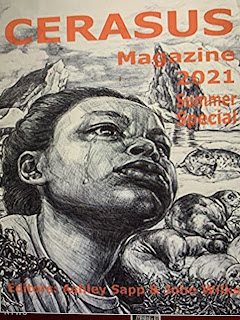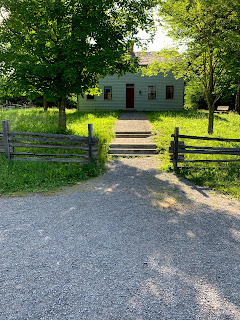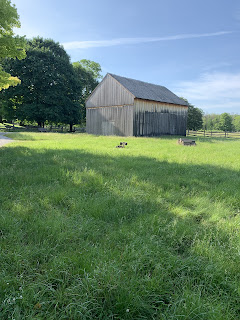Seven years ago I wrote an historical novel in which I imagine the sister of Joseph Smith telling the story of the Mormon prophet. Almost nothing is known of Sophronia Smith, but enough evidence exists to prove that she was present at every important stage of her brother's life.
Although the novel, entitled The True History of Joseph Smith, has sold fairly well at Amazon, I am in the process of revising and re-marketing it. Past readers may note that the new edition now on Amazon reads more fluently and that some unnecessary detail has been pared away. Much thanks goes both to LDS readers and to skeptics who have reviewed the book. I believe that the novel, closely based on the historical record, can appeal to both sides of the divide that has existed ever since 14 year old Joseph claimed that God the Father and Son had appeared to him in the woods behind the family farm in Palmyra NY.
In the process of revising the novel, I recently visited Palmyra, New York where Joseph told his family and then others about his visions and his finding of the gold plates. My first stop was at Hill Cumorah where Joseph and his wife Emma are said to have uncovered the gold plates that became the origin of the Book of Mormon.
I climbed to the top of the hill in the company of a very helpful guide, and thought of the scene in my novel in which Joseph and Emma return to the Smith farm with the plates completely covered:
"Determined to know where my brother and his bride had gone, I sought the counsel of my ever-reliable youngest brother. I found Carlos feeding the chickens. He knew nothing of what concerned me. Going to the fence that ran along the Canandaigua Road, I looked north and south. Then I saw the wagon in question slowly heading in our direction. As it drew nearer, I recognized Joseph as its driver. Beside him sat Emma and on her lap was a large parcel wrapped in a white cloth."
The entire family, except possibly their brother Alvin, immediately accepted the reality of the gold plates but the young prophet did not allow anyone to actually see them. An excerpt from the novel:
"That night Mother and Father were permitted to lift up the Gold Bible but Joseph warned them that it must stay covered by the large table cloth which he had wrapped around it. Hyrum also was allowed to heft its weight, which he estimated to be about forty pounds. After Joseph recited chapters five through seven from Matthew, he said that our family needed to guard the treasure lest evil-minded men seek to steal or destroy it. He then directed each of us to retire to our beds while he found a place of concealment for the Record which only he would know."
My next stop was the Smith family farm, only two miles from the Hill. Here, two young women missionaries gave us a tour of the farm's buildings and fields. They were both very devout and well prepared. Interestingly, the family with whom I took this tour were descended from Joseph's brother, Hyrum, martyred with him in Carthage Missouri in 1844.
The original Smith log cabin has been replaced by a replica, authentic in every detail. Although it was not the actual house, it was a great pleasure to see the tiny room where I could imagine Sophronia and her sister Katherine chatting about their remarkable brother.
The larger house on the property is partly the original Smith home, built largely by Alvin before his death a mere two months after the plates were found. It was easy to picture the highly emotional conversations that took place in this house, as well as the attack on the house launched by local treasure seekers who believed in the reality of the so-called Gold Bible.
The farm is beautifully maintained and it is easy to picture Joseph and his family working and talking in the fields and barn.
Directly adjacent to the farm is a forest known to believers as the Sacred Grove. I found it a very moving place to visit in the early morning and was able to imagine Sophronia and her small brother Don Carlos Smith coming upon Joseph just after he experienced his great dream or vision:
"Entering the woods, we trod noisily in the dry leaves of the previous year and danced merrily about, to the little one's amusement. Nearly at Hathaway Creek, I spied Joseph stretched out at the foot of a lofty oak.
“Look at your lazy brother, sleeping the day away! What do you say to sneaking up on him?”
“Can I wake him up?” asked little Carlos.
“Surely,” said I as we advanced on tip-toe toward his sleeping form. For a second, a dark thought seized me and I feared I was looking upon his corpse. Then Don Carlos had jumped full onto his brother with a great shriek of joy.
Smiling hugely, Joseph seized his little brother in his arms and rolled about, making the most ferocious growling. Carlos squealed with delight as Joseph lifted him high over his head.
“Oh Joseph,” I said. “I am glad you are yourself again. I was so anxious to see you looking downcast.”
“Oh, that's no matter,” he grinned, reaching out to include both of us in his embrace. “The Methodists don't count for a fig now!”
We sat down together as Don Carlos searched for pebbles to throw into the brook. Joseph put his arm around my shoulders and pulled my head onto his chest. I could hear his heart beating.
“I had the most splendid dream, Sophronia. A glorious dream!”
“Do tell me of it!”
“I came here to pray, dear sister for I was sore distressed by the Methodists. I thought they were true Christians but they betrayed my trust.”
“The wretches!”
“Yes, but I forgive them. They know not what they do.” He paused for several minutes and his eyes seemed to gaze into far distances. I prompted him to continue.
“I prayed to the Lord in the name of Jesus. I called out loudly for help. Show me the way, I said to the Lord. Show me the true way. After many hours, I had received no answer and fell into despair. I thought to myself that the Devil rules this world.”
“Oh do not say such a thing, Joseph!”
“It was only a passing fancy, dearest sister. After I was assailed by the demonic fear, I grew weary and lay down under this tree to rest for a moment before again calling out to God.”
Joseph paused again and his eyes grew bright. “A truly glorious dream came unto me.”
“Yes?”
“Or perhaps I awakened and saw with my very eyes? Perhaps this was no dream at all but a true vision like that of Paul on the road to Damascus!”
“Tell me,” I pleaded.
“I saw a pillar of light....there!” He pointed to the empty air above us. “It was beyond the brightness of the sun and slowly the light descended from the heavens until it was all around me. I was in the midst of the brightest light! And in the cloud of light I saw them!”
“Who, dear brother? Who did you see?”
“I saw two holy personages whose brightness and glory were beyond description!”
“Did they speak, Joseph? Did you hear their voices?” I was completely caught up in his dream and breathing fast.
“The older one with the white beard called me by name. He said to me, Joseph my son. And I answered, yes Lord, what will you have of me?”
“Yes? Yes? Did God answer you?”
“Yes, dear Sophronia. You have guessed it. That personage was God himself, the great father of us all and he pointed to the personage at his side, who had long flowing hair and beard of a beautiful auburn shade.”
In the novel, Sophronia nearly always supports Joseph but she never actually sees or hears the supernatural events he describes. In the above scene, she is obviously very encouraging. Later, as he becomes surrounded by his followers, she finds it harder and harder to break through the ring of sycophants and to share her anxieties and warnings with him. The novel concludes with her attempt, along with two of his wives, to rescue Joseph from the murderous crowd in Carthage.
Before leaving western New York, I stopped at the Whitmer farm in Fayette, about 30 miles away, to see the place where Joseph organized his followers into a new church and finished the Book of Mormon. An older missionary and two young women missionaries provided a very thorough tour of the farm, which I took in the company of a devout family from Utah. The children were very knowledgeable about the Book of Mormon, which I confess to finding tedious in the extreme. Mark Twain described it as "chloroform in print" yet sincere people do find value in it.
This is also where three of those followers were convinced that they too saw the gold plates which Joseph had been translating with the aid of scribes and various mysterious instruments such as seer stones.
I can imagine Joseph going into these woods near the Whitmer farm with David Whitmer, Oliver Cowdery and Martin Harris. Although those three are listed in every Book of Mormon as witnesses, all of them were excommunicated by Joseph. His personal magnetism was so great, however, that all three continued to believe in his revelations and never retracted their testimony as to the reality of the gold plates.
Such was the power of an uneducated farm boy's imagination that 200 years after he began to tell his wondrous tales, he is still believed by many millions. I returned from Palmyra more impressed than ever by this remarkable American story.
BUY THE BOOK:

Those interested in reading more of Sophronia's version of Joseph Smith's life can purchase the paperback or kindle copies at Amazon. Although the dialogue and some scenes are imagined, there is no significant detail in the book that contradicts the historical record.
Readers comments are welcome: wildernesshill@gmail.com































